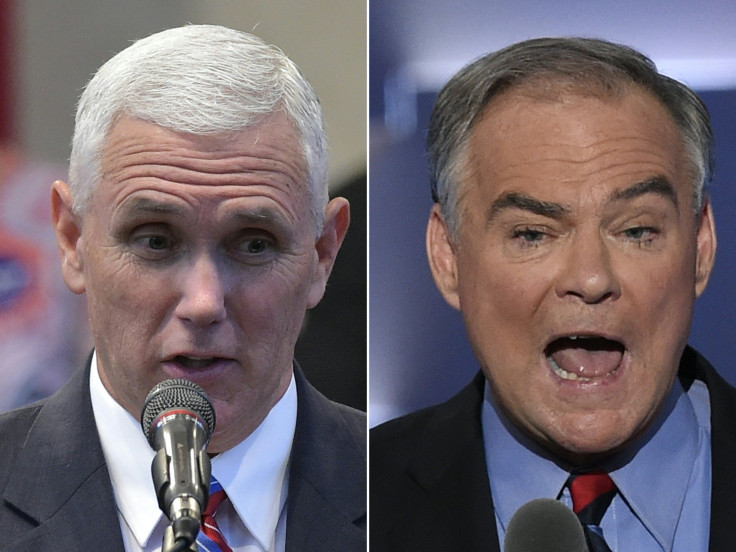Vice Presidential Polls 2016: Before Debate, See Where Tim Kaine And Mike Pence Stand

It's all about the running mates on Tuesday night.
At Longwood University in Farmville, Virginia, Republican Mike Pence and Democrat Tim Kaine will face off in the first and only vice presidential debate. The running mates will no doubt be prodded about their respective nominees' recent controversies, including Hillary Clinton's choice of surrogate in beauty queen Alicia Machado and Donald Trump's leaked tax documents.
Ahead of the debate, Clinton owns a narrow lead over Trump, polling at about 47.5 percent to his 45.0 on average, according to RealClearPolitics. But when it comes to the running mates, neither Pence nor Kaine has much name recognition.
A poll released Sunday by ABC News found that more than 40 percent of voters couldn't name either vice presidential nominee. Even though two-thirds of respondents said they planned to watch the debate, 41 percent didn't know Pence's name and 46 percent didn't know Kaine's.
The candidates' numbers are also similar when looking at favorability. A Gallup poll from early August showed that 33 percent of respondents said they had a good impression of Kaine, while 36 percent said the same for Pence. Pence was more well-liked among Republicans than Kaine was among Democrats.
"Americans' overall image of Kaine has become somewhat more negative since the beginning of the Democratic convention, contrasting with Pence's more positive movement," Gallup wrote at the time. "It is possible that Bernie Sanders voters may have wished that Clinton picked a more liberal running mate, and they are still holding that against Kaine."
Historically, vice presidential candidates' favorable ratings have been higher before the first debate. In 2012, Democrat Joe Biden and Republican Paul Ryan polled at 44 and 43 percent, respectively, according to Gallup. In 2004, Democrat John Edwards had about 56 percent support to Republican Dick Cheney's 48 percent.
"To some extent, this is still their introduction to a big part of the public," Joel Goldstein, of the Saint Louis University School of Law, told USA Today. "Clinton and Trump have clearly been the focus, and Kaine and Pence are less-captivating, [less-]exciting figures."
While Clinton and Trump have many differences on their resumes, there are some notable similarities between Kaine and Pence.
Kaine, 58, previously served as the governor of Virginia and is currently a U.S. senator, while Pence, 57, represented Indiana in the U.S. House of Representatives and currently serves as the governor.
Both Kaine and Pence are expected to deliver their states on Election Day, as Clinton has a big lead in Virginia and Trump has a strong advantage in Indiana.
© Copyright IBTimes 2024. All rights reserved.






















